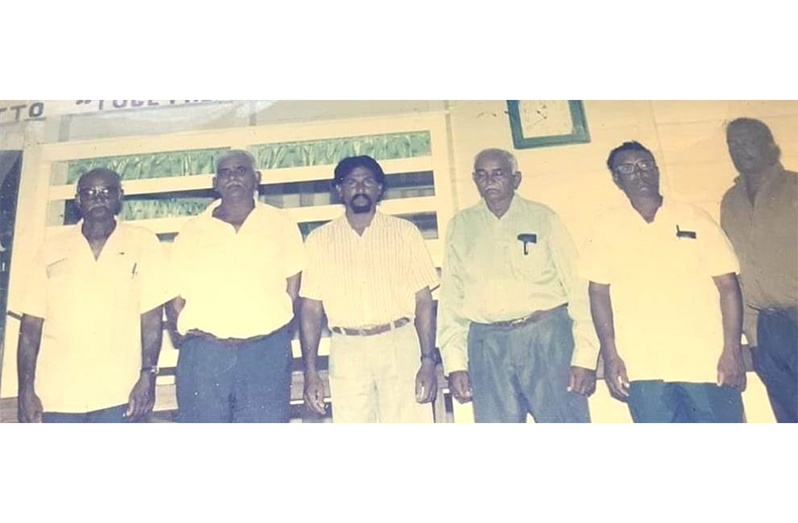… Meet former AREO, Albert James Kalamazad
AS 73-year-old Albert James Kalamazad pauses today to observe the development on Leguan Island, he cannot help but feel a sense of pride and accomplishment, especially as he reflects on the deplorable conditions that existed when he first went to the Essequibo Island more than 40 years ago.
Born in the neighbouring island of Wakenaam, in a village called Good Success, Kalamazad worked as a priest with the Presbyterian Church and became a qualified theologian, so that when the priest in Leguan retired, he was transferred there.
The father of five, who now spends his time between Enterprise Village, Leguan, and the United States of America, held many notable positions on the island over the years, many of which were service oriented.

Before he became the Assistant Regional Education Officer (AREO) and Chairman of the Leguan Neighbourhood Democratic Council (NDC), Kalamazad spent some years as a teacher in Wakenaam, and then later at the Leguan Secondary School. When he got his Diploma in Education, he then began teaching at the Cyril Potter College of Education (CPCE), where he became a senior lecturer.
“I really enjoyed teaching; I liked to teach children in particular, imparting knowledge,” he reflected. Even today, he’d still help out the younger folks whenever he gets an opportunity, and, like many other teachers, he loves when they remember him when they’re all grown up and approach to say hello.

One of the most vivid experiences in his memory is his work with a group of Charlestown Secondary School students preparing for CXC. “The class was made up of children whom we felt could not make it,” he related. Keeping a positive attitude towards them, though, he tried to work with them, even though it was very challenging.
“When I started to teach, they behaved in a rude manner, so I stopped teaching. I sat down, and a few days later, a few of them came and asked me why I am not teaching. I asked for their cooperation and resumed teaching. I worked with them feverishly for the next eight months, and most of them performed very well at the CXC.”
To think that these children were “counted out”, so to speak, but were able to be helped has left a lasting impression. These and other positive experiences have made the teaching profession very enjoyable for Kalamazad.

In 1995, though, he was asked to take up an appointment as AREO, which he did until 2004. Among the many posts he’s held, Kalamazad enjoyed this one the most, mainly because he felt he could be of much help in moving the island of Leguan forward.
“When I came to Leguan, it was down in the drain, to put it locally; dilapidated buildings, schools, hospital, post office, etc. Roads, sea defences and drainage had all needed rehabilitating,” he recalled. But within a short time, rehabilitation works commenced. Furthermore, farming on the island improved. “We were at one point planting about 4,000 acres of rice plants, which was an achievement,” he said.
The sea defences also had to be rebuilt. “Leguan is 17 ½ square miles, and at the front where you have the steamer stelling, there is a stretch of land, from Goodman, Freetown to Canefield, which is about 16 miles. Most of it was rehabilitated; it faces the Atlantic and the Essequibo River… It took us some time, but we were successful under the PPP government.”
LEADERS ARE SERVANTS

Kalamazad is happy that he made a meaningful contribution towards the development of Leguan, and shared some of the things that were especially helpful to him in this regard. First, he mentioned the quality of humility.
“Humility is very important; you are the servant of the people, and you should not lord it over them. Leaders are servants; people might not be as educated as you are, but you have to listen to their problems, and see how best you can help,” he expressed.
This quality will also affect how well a leader is able to help people care for their problems. “Yes, farmers are going to come with problems; sometimes they are going to behave cantankerous. What are you going to do? As a leader, I used to listen very attentively, and after they would have calmed down, I would ask what I could do to help.”
A second thing a leader must ensure is that he strives to keep himself educated, according to Kalamazad. “You have to know the rules and regulations that govern the NDC, etc; that’s why I told the councillors of that time that they had to read 28:02, which is actually the Council’s Bible,” he said.
Kalamazad obtained his Bachelor’s Degree in Theology in Jamaica, and later went to Scotland to do his Masters in Liberation Theology and Philosophy. He then applied to the University of Guyana, and was accepted in the post-grad programme to do the Diploma in Education. He also has a Diploma in Management and Social Work, and once worked as a marriage officer, Justice of the Peace, Commissioner of Oaths to Affidavits, and Valuation Officer.




.png)









